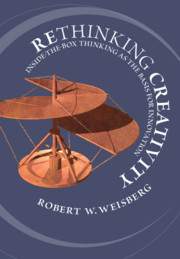Book contents
- Rethinking Creativity
- Rethinking Creativity
- Copyright page
- Dedication
- Contents
- Figures
- Tables
- Part I Introduction
- Part II Analytic Thinking in Creativity
- Part III The Question of Extraordinary Thought Processes in Creativity
- 6 How Do You Get to Carnegie Hall? Practice, Talent, and Creativity
- 7 Insight in Problem-Solving and Creative Thinking
- 8 The Question of Unconscious Processes in Creative Thinking
- 9 Genius and Madness
- Part IV The Psychometrics of Creativity
- Part V The Neuroscience of Creativity
- References
- Index
9 - Genius and Madness
from Part III - The Question of Extraordinary Thought Processes in Creativity
Published online by Cambridge University Press: 01 October 2020
- Rethinking Creativity
- Rethinking Creativity
- Copyright page
- Dedication
- Contents
- Figures
- Tables
- Part I Introduction
- Part II Analytic Thinking in Creativity
- Part III The Question of Extraordinary Thought Processes in Creativity
- 6 How Do You Get to Carnegie Hall? Practice, Talent, and Creativity
- 7 Insight in Problem-Solving and Creative Thinking
- 8 The Question of Unconscious Processes in Creative Thinking
- 9 Genius and Madness
- Part IV The Psychometrics of Creativity
- Part V The Neuroscience of Creativity
- References
- Index
Summary
Chapter 9 examines the long-standing hypothesis that psychopathology plays a role in creative thinking – genius and madness. Modern opinions on the relationship between creativity and psychopathology vary widely, ranging from the idea that psychopathology influences creativity, to the complete opposite – that there is no relation between genius and madness. This chapter examines the complexities involved in trying to determine if there is a relationship between genius and madness. It begins with a discussion of how one might try to test the hypothesis that psychopathology facilitates creativity. We then review the literature on genius and madness; specifically, the possible relationship between creativity and two disorders, bipolar disorder (manic-depressive disorder) and schizophrenia. Many researchers have concluded that mild forms of psychopathology, rather than full-blown disorder, may be related to creativity. We examine the evidence for that conclusion. The discussion places the study of genius and madness in the broader social context and examines the many factors that play a role in determining whether or not psychopathology and creativity are related.
Keywords
- Type
- Chapter
- Information
- Rethinking CreativityInside-the-Box Thinking as the Basis for Innovation, pp. 284 - 316Publisher: Cambridge University PressPrint publication year: 2020

